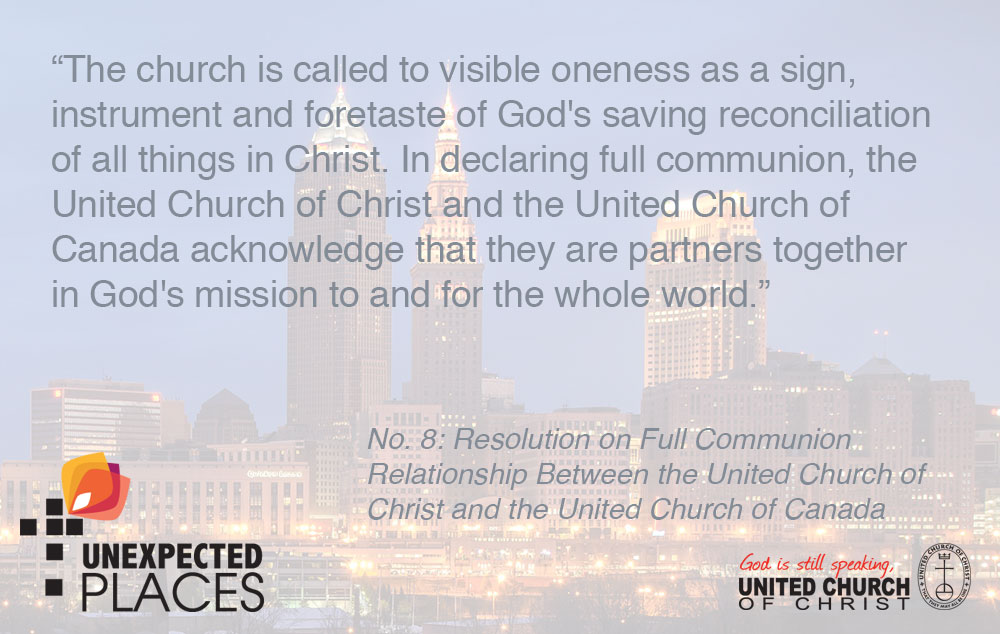General Synod to consider resolution for full communion with United Church of Canada
 Two years ago, the General Synod of the United Church of Christ voted to strengthen the denomination’s relationship with a neighboring church to the north. Now, the UCC and the United Church of Canada are on the doorstep of full communion between the two North American churches—a partnership in mission that would enhance the ministry of each denomination—fulfilling the promise the churches made in 2013.
Two years ago, the General Synod of the United Church of Christ voted to strengthen the denomination’s relationship with a neighboring church to the north. Now, the UCC and the United Church of Canada are on the doorstep of full communion between the two North American churches—a partnership in mission that would enhance the ministry of each denomination—fulfilling the promise the churches made in 2013.
Delegates of the UCC General Synod 2015 will be asked to approve a resolution for full communion with the United Church of Canada when the biennial gathering takes place June 26-30.
The two denominations look forward to a dynamic and growing relationship. “It is a mutual commitment to grow together toward a vision of the church that enriches our theological traditions, enhances service and mission, and deepens worship. The United Church of Canada and the United Church of Christ will find diverse expressions of what it means to live in full communion in Christ as we experience life together,” the resolution reads.
“The United Church of Christ and the United Church of Canada are the only two ‘United and Uniting’ churches in North America,” said the Rev. Geoffrey A. Black, UCC general minister and president. “The two have known of each other, we’ve worked together and we hold many things in common. But there has been no formal relationship.”
The Rev. Karen Georgia A. Thompson, UCC ecumenical and interfaith officer, said that “the vote we will take is a beginning that this agreement, once the United Church of Canada takes its vote, benefits both churches as we think about mission and life together in North America.”
A full communion is an agreement for two or more churches to recognize each others’ sacraments and the ordination of ministers, allowing them to be called by congregations of either denomination. This would be the UCC’s fourth full communion agreement and the first for the United Church of Canada, the largest Protestant denomination in Canada with about 3 million members in more than 3,500 congregations. The UCC has a full communion with the Christian Church (Disciples of Christ), a four-way Formula of Agreement with the Presbyterian Church (USA), the Reformed Church in America, and the Evangelical Lutheran Church in America, and a “Kirchengemeinshaft” with the Union of Evangelical Churches in Germany (UEK).
Both churches have common ecumenical partners and share similarities on their passion for social justice and peace, inclusion of LGBT people and ordination of women.
“They are a progressive voice for Christianity in Canada, just as we are a progressive voice for Christianity in the United States,” Black said.
The UCC and the United Church of Canada began a formal conversation in April 2012, when the UCC made a historical visit to the United Church of Canada’s offices in Toronto. The denominations have grown closer since, collaborating on the upcoming agreement. After a year of study and engagement, 12 representatives of both churches (six from each church) will bring a common document to both General Council 2015 and General Synod 2015.
“Many members of the United Church of Canada worship in UCC churches in Florida during the winter and when they are on vacation there, and many members of the UCC on the northern [U.S] border have fellowship and work together in common witness with churches from the United Church of Canada,” Black said. “One example, from my time as a conference minister in New York, is churches from the Black River-St. Lawrence Association—which is in northern New York and next to the border with Canada—often meet and worship with their Canadian counterparts.”
This specific resolution cannot be amended or altered when it comes to the floor, because both denominations must approve the same document. Delegates will be asked simply to vote in favor of or against the resolution. The 42nd General Council of the United Church of Canada meets in August in Corner Brook, Newfoundland, to approve the communion. Both churches then need to sign a formal document and have a joint liturgical celebration, planned for the fall.
Related News
A Prophetic Call for Justice and Peace in Palestine
The executive leaders of the United Church of Christ have issued the following statement...
Read More‘Love is Greater Than Fear’: Regional Youth Events get to the heart of gospel message
United Church of Christ teens attending this summer’s Regional Youth Events (RYE) are...
Read MoreUCC desk calendars available to order now
Prepare for your day, month and year with the United Church of Christ desk calendar —...
Read More


